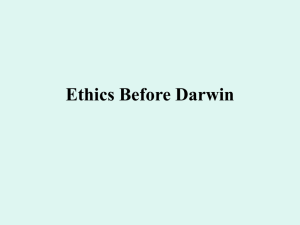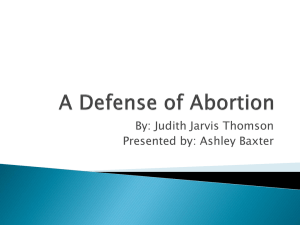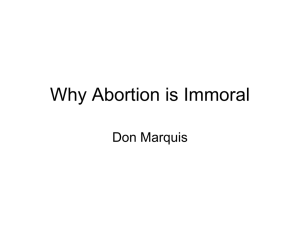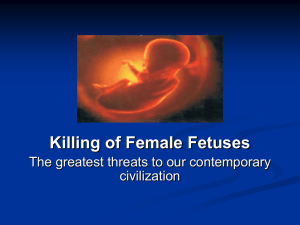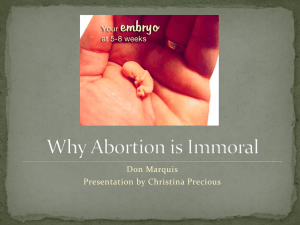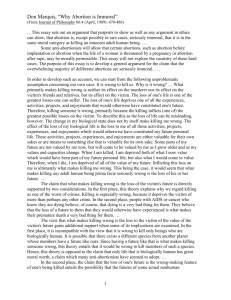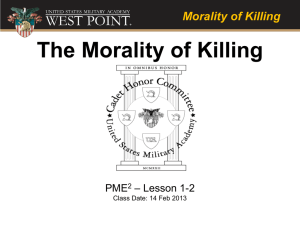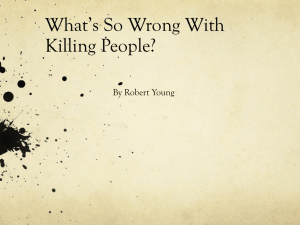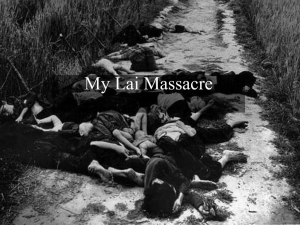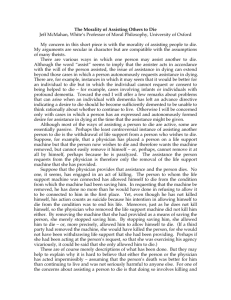Consistently Pro-Life The Ethics of Bloodshed in
advertisement
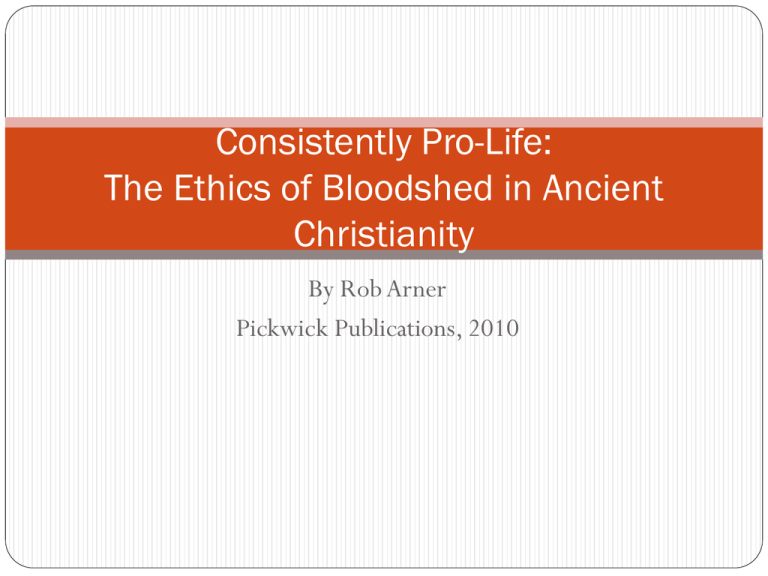
Consistently Pro-Life: The Ethics of Bloodshed in Ancient Christianity By Rob Arner Pickwick Publications, 2010 The Debate over the Early Church and Military Service There is a lively ongoing debate about the attitudes of the early Christians toward war and military service. Generally, pacifists (e.g. Bainton, Hornus, Cadoux) believe the ancient Christians were (like themselves) pacifist, and claim the church fundamentally objected to killing of the army. Non-pacifists (e.g. Helgeland, Ryan) tend to believe the early church was (like themselves) not pacifist, and claim it was chiefly the idolatry of the Roman legions to which the church objected. The Debate over the Early Church and Military Service In a classic 1946 article in The Harvard Theological Review, Roland Bainton sums up the competing conclusions well “Objectivity is difficult for Christian scholars dealing with this question because the problem is still acute and the practice of the early church is commonly regarded as in some measure normative for present practice.” In other words, we tend to imagine that the early church is just like us! Missing the Forest for the Trees Military service per se was not the main issue. It’s a subsidiary question. Based on my reading, the church’s objections were to both killing and idolatry. I want to show you today that the church had especially deep moral scruples about killing. My Research I set out to do my own research into this question, but broadening my scope beyond just Christians in military service. I read in translation all surviving orthodox Christian literature from before 311. Key research question-What do these texts suggest about early Christian teaching concerning the killing of human persons? Overall Conclusion Without exception, the teaching of the pre-Constantinian Church was explicitly and categorically opposed to killing human beings in any form. Do you find that conclusion hard to swallow? I know I did before doing the reading for myself! Really? Rarely wise to speak in terms of absolutes in doing historical research Caution and intellectual humility around sweeping claims Always open to charges of ideological bias My Conclusion, Succinctly Stated No extant orthodox Christian writing dating from before Constantine’s Edict of Milan in 311 ever approves of Christian participation in human bloodshed. Ancient Church discipline forbade killing as incompatible with the moral life of Christian disciples. Why? Startlingly unanimous conviction Underlying idea- Human life is not ours to take. Human life belongs to God who made it As its creator, only God may take it Humans doing so usurps the divine prerogative, commits idolatry Abortion and Infanticide Both the exposure of infants and chemical or surgical abortions were commonplace in Greco-Roman society (See Gorman, Abortion & the Early Church). Christians opposed the killing of unwanted children, either before or after birth. Abortion and infanticide are two-sides of the same coin for the ancient Christians. Examples-Abortion and Infanticide “Do not kill a fetus by abortion, or commit infanticide” –Didache 2.2 Refuting pagan charges that Christians killed and ate their children, apologist Athenagoras replies, “Again, we call it murder and say it will be accountable to God if women use instruments to procure abortion: how shall we be called murderers ourselves? The same man cannot regard that which a woman carries in her womb as a living creature, and therefore as an object of value to God, and then go about to slay the creature that has come forth to the light of day. The same man cannot forbid the exposure of children, equating such exposure with child murder, and then slay a child that has found one to bring it up. No, we are always consistent, everywhere the same, obedient to our rule and not masters of it.” (Plea for Christians, 35. Examples- Abortion and Infanticide “We have been taught that to expose newly born infants is the work of wicked people”-Justin Martyr, First Apology, 27. “Women who resort to some sort of deadly abortion drug kill not only the embryo but, along with it, human kindness” Clement of Alexandria, Christ the Educator, 2.10. Examples- Abortion and Infanticide God “certainly requires us to bring up the offspring and not to destroy the children given by providence” –Origen, Against Celsus 8.55 “But with us, murder is forbidden once for all. We are not permitted to destroy even the fetus in the womb, as long as blood is still being drawn to form a human being. To prevent the birth of a child is a quicker way to murder. It makes no difference whether one destroys a soul already born or interferes with its coming to birth. It is a human being and one who is to be a man, for the whole fruit is already present in the seed.” –Tertullian, Apology, 9. Killing in War We shouldn’t be going back and forth over the presence of Christians in the Roman military in those early years. We ought to be considering military service as a subquestion under the church’s attitude toward violence and bloodshed. This, is the interpretive key that clears up the ambiguity of the historical data. Killing in War – The Apostolic Tradition The key text is from Hippolytus’ Apostolic Tradition, a church order from the first decade of the 3rd century which represented a kind of early church consensus. In the midst of a list of occupations and practices which come under the church’s scrutiny in order for an inquirer to be admitted to the church’s catechumenate, we read: Killing in War – The Apostolic Tradition “A soldier in command must be told not to kill people; if he is ordered so to do, he shall not carry it out. Nor shall he take the oath. If he will not agree, he should be rejected [from the catechumenate].” “Anyone who has the power of the sword, or who is a civil magistrate wearing the purple, should desist, or he should be rejected. “ “If a catechumen or a believer wishes to become a soldier they should be rejected, for they have despised God.” (Apostolic Tradition 16:9-11) Killing in War – The Apostolic Tradition What this means1. 2. 3. Soldiers who convert to Christianity while in the army must agree not to kill anyone (or swear the idolatrous military oath), even if ordered to do so. However, they are permitted to remain in their occupation under these conditions. Any imperial official who “has the power of the sword” is not permitted to remain in his/her post, but must resign. The gate does not swing the other way- Christians or catechumens may not join the army of their own volition. Militia Christi Imagery Church not opposed to using militaristic imagery and metaphors Harnack called this militia Christi language. The church saw itself as a disciplined army for Christ- but with a crucial difference from Caesar’s legions- the militia Christi was “an army that shed no blood.” Militia Christi Imagery The worship of God “is a kind of heavenly military service” – Lactantius, Divine Institutes, 5.19. The church is “God’s militia” –Tertullian, On Prayer, 19.5. “We come together for a meeting and a congregation, in order to besiege God with prayers, like an army in battle formation. Such violence is pleasing to God” –Tertullian, Apology, 39.2. A Bloodless Army “But when the shrilling trumpet blows, it assembles the soldiers and proclaims war; and shall not Christ, think you, having breathed to the ends of the earth a song of peace, assemble the soldiers of peace that are his? Yes, and He did assemble, O man, by blood and by word His bloodless army, and to them He entrusted the kingdom of heaven” –Clement of Alexandria, Exhortation to the Greeks, 11. Categorical Statements Against Killing Jesus “did not consider it compatible with his inspired legislation to allow the taking of human life in any form at all” –Origen, Against Celsus, 3.7. “Yet did not the Creator design those creatures of His for man’s destruction? Certainly not. He forbids man-slaying by one summary commandment: ‘Thou shalt not kill’” – Tertullian, The Spectacles, 2.8 Categorical Statements Against Killing “For when God forbids killing, He not only prohibits us from free-booting, which is not permitted even by public laws, but He also advises that those things also, which are regarded as lawful among men, should not be done. So, neither will it be permitted a just man, whose service is justice herself, to enter military service, nor can he accuse anyone of a capital crime, because there is no difference whether you kill a man with a sword or a word, since the killing itself is prohibited.” "Therefore, in this command of God, no exception whatsoever must be made. It is always wrong to kill a man whom God has intended to be a sacrosanct creature.” – Lactantius, Divine Institutes, 6.20. OK, so now what? Description does not equal prescription The applicative question left open Point for discussion What relevance (if any) does the ancient Christian convictions and praxis have for us today?
